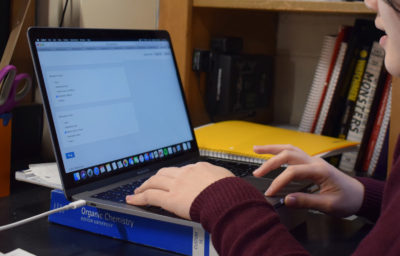
The Boston University provost-appointed Task Force on Evaluating Teaching initiated an expanded pilot program for online course evaluations — in lieu of paper evaluations — in several BU schools this semester.
The pilot program was launched to address student requests for online evaluation forms, Gillian Pierce, the university’s director of learning assessment and task force chair, said.
“Students have been wanting online course evaluations for a long time now, and they also have wanted results to be shared with them, so in response to that, we had asked for this expanded pilot of online course evaluations,” Pierce said.
The task force first successfully tested online evaluation forms last spring in a select number of College of Arts and Sciences courses. Most notable in their results, Pierce said, was the fact that students responded at the same rate for the online evaluations as for paper evaluations, an initial concern to faculty, warranting the expanded pilot.
“Part of our charge was to … ensure maximum response rates because I think that’s one concern that faculty have about a move to online course evaluation,” Pierce said. “[Because] the response rates in those courses were very similar to the response rates for paper evaluations … we were pleased to think about expanding the pilot.”
All courses in CAS, the College of Communication, the School of Education, and the School of Law will have online course evaluations this semester. The College of Fine Arts will join the pilot program in the spring. The schools participating in the program were included on a voluntary basis, Pierce said.
Daryl Healea, the assistant dean for curriculum and enrollment services, wrote in an email that CAS decided to partake in the expanded pilot because it offers benefits to students, faculty and administration.
“Based on smaller-scale online pilots that CAS and other schools/colleges participated in previously, we’ll see more expansive feedback from students in the comments sections, a potential for decreased costs, a reduction in the amount of time it takes to receive evaluation results, and an ameliorated workflow for our many academic administrators,” Healea wrote.
Journalism professor Mitchell Zuckoff said he thinks online evaluations will likely allow professors to more quickly receive feedback relative to paper evaluations.
“I have been satisfied with the old system, but my one complaint is that it always took a very long time to get the results,” Zuckoff said. “I’m very excited by the idea that you should be able to get results very quickly. The sooner we get the evaluations, the sooner we can learn from them and put them into practice the following semester.”
Online evaluations also offer flexibility for students to provide course feedback when they are not present in class, journalism professor Chris Daly said.
“Online could be great because whatever day you roll the dice and decide to have the evaluations, under the old system, inevitably someone was absent and sometimes a bunch of people would be absent [and] they would just miss out on the opportunity altogether,” Daly said.
However, Daly said he wished there was more faculty consultation and discussion before the implementation of the expanded pilot program.
“It’s too bad that as far as I know, there was no faculty consultation,” Daly said. “I would love to hear some discussion about this and some evidence of how one thing is good or one thing is better.”
Several students said they supported a move to online evaluations on account of their ease of use and efficiency.
Ronaq Mathur, a sophomore in CAS, said online evaluations are more convenient than hard copy evaluations.
“It’s extraordinarily more convenient because now, as long as I have my phone … I can just quickly log in as long as I have the link and do the form,” Mathur said. “I did it today and it takes about five or six minutes. I thought it was actually quite fast — definitely quicker than the hard copy version.”
Mackenzie Hall, a sophomore in the College of Engineering, said she thinks if students are given time to complete online evaluations in class, they are likely to respond to them at the same rate and with the same quality responses as with paper evaluations.
“As long as they give you time during class, then they’re just as likely to respond,” Hall said. “You’d probably still get the same amount of people and probably get the same quality of comments.”
Danielle Gabriel, a junior in CAS, said she thinks online evaluations would be more efficient.
“It might be a little more efficient,” Gabriel said. “Everything done with the media now is more effective in getting it done on time and more prompt.”























































































































